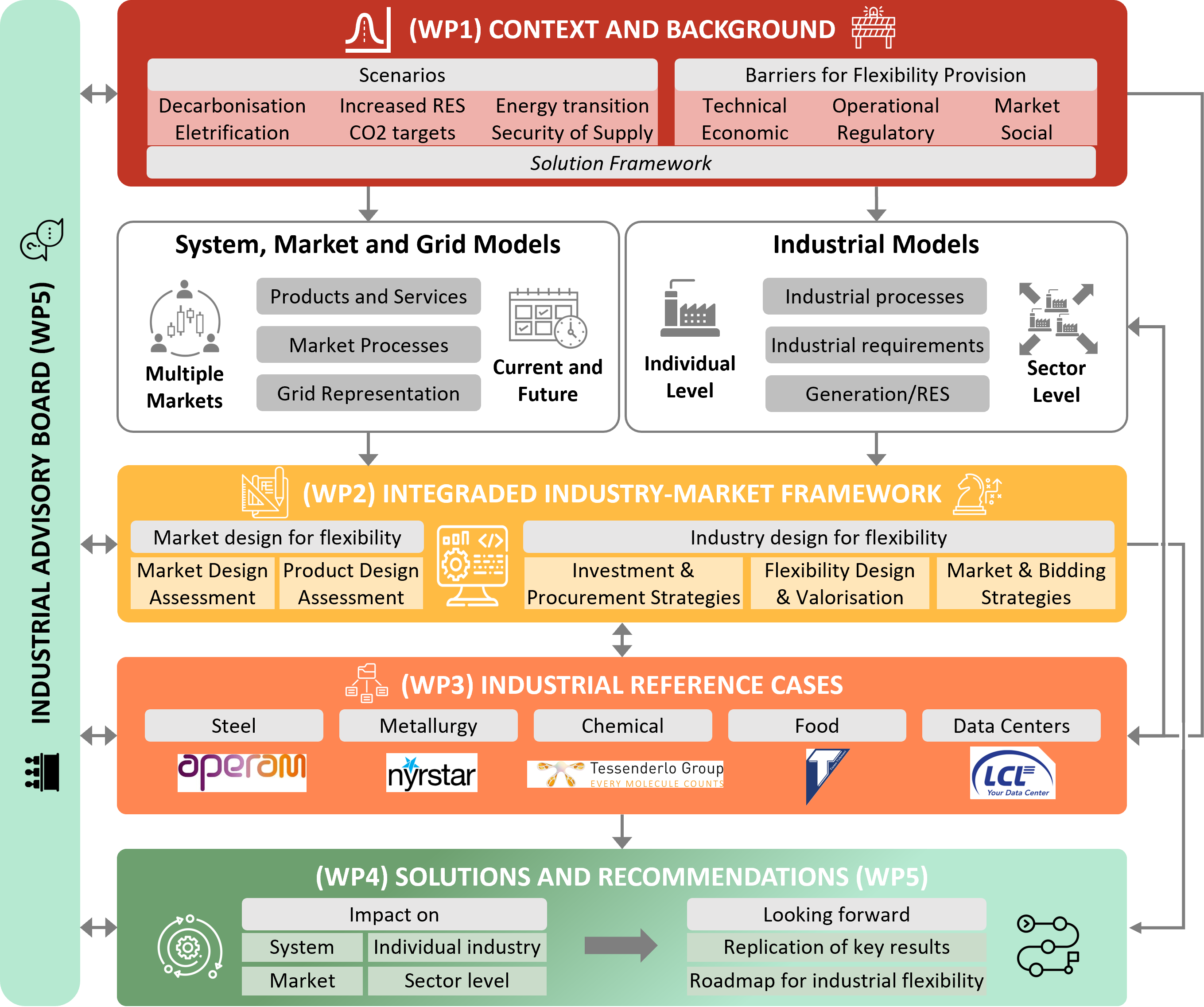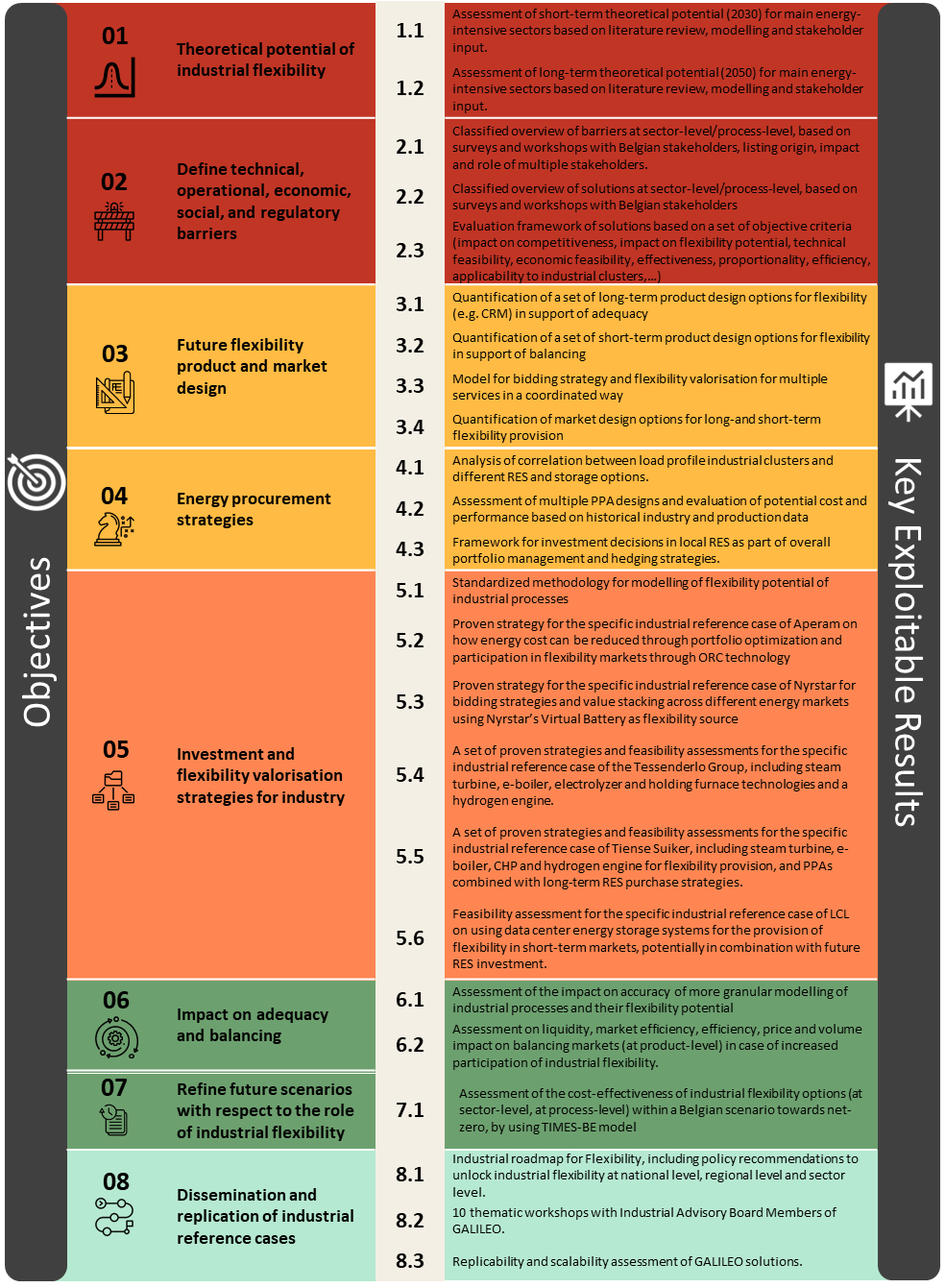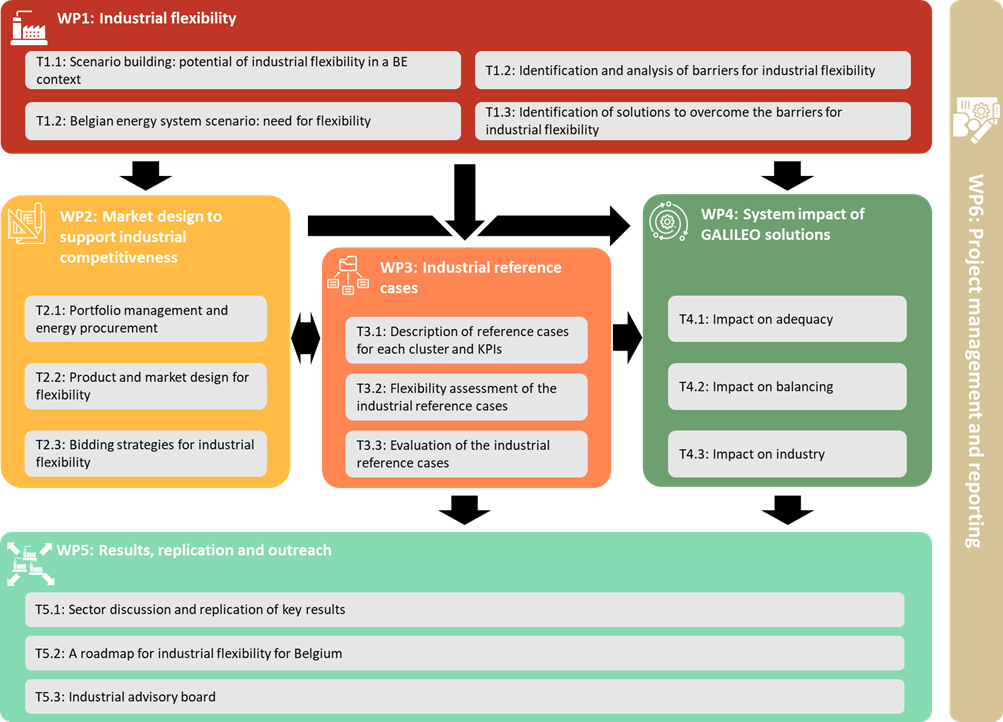The project in brief
GALILEO aims to support further decarbonization, electrification and flexibility provision from industry towards de grid. Flexibility is important to mitigate grid investments and to balance the system. GALILEO explores the flexibility potential of industrial processes and examines solutions to unlock industrial flexibility by addressing technical, operational, economic and regulatory barriers. GALILEO combines academic models, with industrial cases from different energy-intensive sectors.
Project Approach
GALILEO provides insights at individual company level, at sector level and at system level by using both fundamental/academic modelling and applied industrial research. This is accomplished via a 4 step approach:

Scenario Building (WP1 & WP4)
GALILEO develops two core energy transition scenarios for Belgium: one excluding and one including industrial flexibility. These are built on EnergyVille’s PATHS2050 and Elia’s AdFlex study, incorporating projected electrification and decarbonization pathways. Sector-specific analyses, supported by TIMES modeling and industry workshops, evaluate how and when different industrial sectors—like chemicals, food, metallurgy, cement, and data centers—can cost-effectively contribute flexibility. The goal is to compare the role of industrial flexibility to other system-level resources and assess its contribution to long-term security of supply and balancing.
Fundamental Modelling (WP2 & WP4)
This work package assesses how industrial players can reduce cost and risk exposure through tailored energy procurement strategies, notably Power Purchase Agreements (PPAs) combining renewables and storage. GALILEO models the business case and system impact of different flexibility products, capacity market designs, and market participation strategies. It builds mathematical models of industrial processes to estimate real flexibility potential and integrates them with detailed market simulations to test how industries can best bid into wholesale, balancing, and congestion markets. The effects on prices, social welfare, and industrial revenues are quantified under multiple regulatory and market design scenarios.
Industrial Reference Cases (WP3)
Six industrial players—representing key Belgian industrial sectors—serve as in-depth case studies. For each, GALILEO defines and analyzes specific flexibility use cases, applying the previously developed models and strategies to real operational settings. These reference cases are used not only to validate methods and refine results but also to inform sector-wide insights and policy discussions. Results are shared with industry peers to stimulate replication, collaboration, and alignment around actionable policy recommendations.
Outreach and Replication (WP5)
GALILEO creates an Industrial Advisory Board (IAB) to guide the project, validate findings, and ensure practical relevance. The IAB meets quarterly and includes stakeholders from all key sectors. To scale impact, GALILEO aligns with Elia’s grid user engagement processes and organizes workshops to disseminate best practices. The project concludes with a comprehensive “Industrial Roadmap for Flexibility,” offering tailored recommendations for industry and policymakers, with replication potential at both Belgian and EU levels.
Objectives

To clearly demonstrate the link between GALILEO objectives, approaches and results (KERs), the colour coding used represent: red the context and background of industrial flexibility (WP1); yellow GALILEO industry and market design for flexibility modelling (WP2); orange GALILEO industrial reference cases (WP3); green the system impact of GALILEO solutions (WP4); and turquoise the results, replication and outreach of GALILEO (WP5).

Work Packages

WP1: Industrial flexibility
This first work package studies the potential of industrial flexibility in a Belgian context, differentiated according to type of industry and the electrification potential of processes in the short, medium, and long term. To estimate future flexibility needs and the potential contribution of industry, this work package calculates a scenario update for the Belgian energy system. In addition, it identifies remaining technical, operational, economic, regulatory, and social barriers that hamper the exploitation and valorization of current and future flexibility potential, and proposes solutions to overcome these barriers, which are further investigated in the next work packages.
WP2: Market design to support industrial competitiveness
Deploying current and future industrial flexibility requires companies to rethink their energy purchasing strategies. The energy procurement process and portfolio management for industrial consumers change rapidly due to investments in own RES, electrification of processes, and the dynamic energy market context. This work package analyzes the impact of this changing market context on the energy investment and procurement strategy of industrial consumers. It also analyzes the impact of product and market redesign for offering industrial flexibility, considering the participation of all potential types of flexibility, including industrial flexibility, while adhering to the principle of technology-neutrality. Finally, this work package proposes bidding strategies that allow industrial flexibility to participate in all relevant flexibility market segments and valorize their flexibility across different segments optimally.
WP3: Industrial reference cases
In this work package, we evaluate different applications of industrial flexibility through real-life industrial reference cases. These test cases cover the relevant industrial clusters in a Belgian context. First, we describe the applicable Business Use Cases (BUCs) for the different reference cases using a common methodology to ensure project-wide compatibility and specify the KPIs for evaluation. Next, we assess the technologies in each reference case to determine their flexibility potential. Finally, we evaluate the valorization potential of industrial flexibility and calculate the corresponding KPIs.
WP4: System impact of GALILEO solutions
This work package evaluates the impact of GALILEO solutions on the overall energy system. Based on insights from previous work packages, it examines how to improve the modelling of industrial flexibility to enhance adequacy assessments and provides system operators (including Elia) with guidance for improving their assessment methods and planning models such as TIMES (Paths 2050). It also estimates the contribution of industrial flexibility to short- and medium-term balancing needs in Belgium. Based on these analyses and prior results, the package generates updated system scenarios for 2030–2050, considering the effects of decarbonization, industrial flexibility, and industrial competitiveness.
WP5 Results, replication and outreach
This work package derives a comprehensive set of lessons learned from earlier work packages. It analyzes the scalability and replicability of the industrial reference cases and provides replication guidelines tailored to the Belgian context. The package also develops a roadmap for industrial flexibility in Belgium, with concrete recommendations for market and product design adaptations and regulatory reforms. An industrial advisory board is organized to gather feedback and input from stakeholders to strengthen outcomes and inform future policymaking.
WP6: Project management
This work package coordinates the internal project workflow (including meetings and workshops), manages communication with the funding agency, and organizes dissemination and consultation activities. It includes project management, reporting, and risk management to ensure smooth collaboration among partners and alignment with the project workplan. A detailed communication and dissemination plan is developed, beginning with a project website and followed by regular stakeholder engagement through the advisory and industrial boards.
